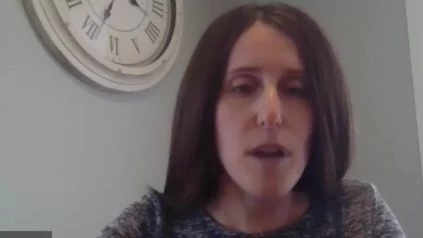Laurie Schenkel of Ribon Therapeutics @RibonTx discusses a potent and selective PARP14 inhibitor decreases pro-tumor macrophage function and elicits inflammatory responses in tumor explants.
__________
PARPs (poly-ADP-ribose polymerases) are a family of enzymes that regulate a wide variety of important cellular processes including cellular stress signaling pathways implicated in inflammation and cancer. PARP14 is a member of the monoPARP sub-family of PARPs, which catalyze transfer of a single ADP ribose unit (mono-ADP-ribosylation or MARylation) to their substrates, unlike their polyPARP counterparts which construct chains of ADP ribose units (poly-ADP-ribosylation or PARylation). PARP14 is an interferon-stimulated gene (ISG) that is overexpressed in tumors compared to normal tissues and has been implicated by genetic knockout studies to promote pro-tumor macrophage polarization and suppress antitumor inflammatory response due to its role in modulating IL-4 and IFN-γ signaling pathways.
Efforts to further explore and validate the role of PARP14 catalytic activity in these pathways have been hampered by a lack of potent, highly selective PARP14 inhibitors. Here we describe the discovery of the first such chemical probe, RBN012759, which inhibits PARP14 with an IC 50 of 0.003 µM and exhibits >300-fold selectivity over all mono- and polyPARP family members. Medicinal chemistry efforts that began with an unselective micromolar screening hit were enabled by a detailed understanding of the PARP14 and broader PARP family binding pockets. X-ray co-crystal structures of RBN012759 and key early analogs bound to PARP14 clearly illustrate the origins of their potency an selectivity.
RBN012759 is a cell permeable, soluble probe that demonstrates robust, dose-dependent stabilization of endogenous PARP14 and inhibition of MARylation in primary human macrophages. RBN012759 reverses IL-4 driven (pro-tumor) gene expression in macrophages, confirming published data generated with PARP14 KO and supporting an immune suppressive role of PARP14 in tumors. Moreover, we demonstrate that PARP14 inhibition in primary human tumor explants can induce an inflammatory mRNA signature similar to immune checkpoint therapy.

